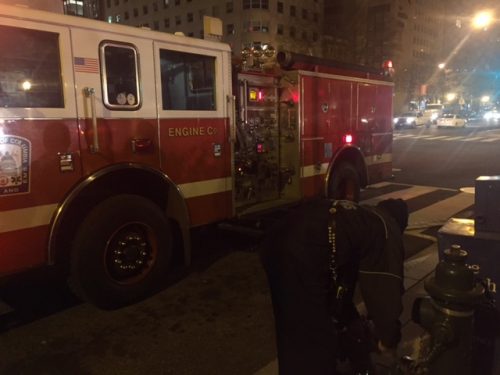This article is more than 5 years old.
I attended the Coalition of Networked Information (CNI) meeting in Washington, D.C. on December 12 and 13. This trip offered a novel experience — my hotel caught fire early on Tuesday morning and we were evacuated at 4:30 am. Eight fire trucks later, the small laundry fire was put out and we were allowed to re-enter around 6:00 am. I knew it was not a drill when the firemen started connecting the hoses:

The fire evacuation seemed to fit with the undercurrent of unease at this meeting as the conference had an ongoing theme and concern — how will the U.S. administration change federal funding for research? Canadian librarians met with Brewster Kale to talk about mirroring the Internet Archive in Canada at this meeting.
Here are some of the sessions I attended:
Update on Funding Opportunities
This was a sober group with great concern about how their budgets will be impacted. Based on projected plans, they discussed relevant grant opportunities.
NEH — assuming continuing funding, will be offering two rounds of Digital Humanities Advancement grants with deadlines in January and June.
IMLS — new program with emphasis on community archiving
CLIR — new “recordings at risk” program will have four rounds with deadlines in January, June, and December 2017 and May 2018
Rendering and Readings: Future of the Scholarly Monograph
Fascinating session with presentation from Johns Hopkins, Michigan, and NYU. Michigan talked about their support of the Lever Press, a joint initiative of liberal arts colleges in the Oberlin Group. NYU talked about their Enhanced Networked Monographs project that enriches texts with semantic tags. They use a tool called Readium (available as a Google app) as a user interface.
Yours, Mine, Ours? The FOIA Archive
This session looked at the challenges faced in supporting faculty research projects using the ambitious FOIA Archive project at Columbia as a case study. History professor Matthew Connelly is collecting large datasets of declassified from federal agencies, including NARA. He has built tools to search and access the content in different ways. Like many such projects, support and sustainability has become a library responsibility. The AUL for Collections and Service (Barbara Rockenbach) and Columbia’s Head of Library IT talked about the challenges of supporting such projects and prioritizing resources.
HathiTrust Research Center
Presentation about the research arm of the HathiTrust and the tools they are developing. They are opening up the entire dataset of the HathiTrust (even the copyright protected portion) for text mining. They use Bookworm as a text visualization tool and look to offer workshops in coming year.
Spaces for Learning and Scholarship
Presenters from Michigan and Notre Dame shared lessons learned from initial learning and scholarship spaces as they are renovating and adding to spaces built as recently as three ago. Some of the things learned included:
- Open offices did not work for staff in public spaces; offices with glass walls that offered accessibility but quiet were better for productivity
- Introductory training workshops were so popular that they taxed teaching capacity; turned them into online workshops
- Both offered “design labs” as a soft makerspace with sketchpads, whiteboards, cart with craft supplies, and design software
- Michigan uses 3-D printing to create printing blocks for their letter press
The Digital Preservation Ecosystem
Representatives from the major membership preservation networks presented about their services, including:
- Digital Preservation Network (DPN)
- Academic Preservation Trust (AP Trust)
- HathiTurst
- DuraSpace
- Chronopolis
The presentations were pretty much information you can get from their webpages; the interesting part of this session was the Q&A. Elliot Shore, executive director of the Association of Research Libraries, asked why there were so many digital preservation options. Wouldn’t it be more efficient if we all pooled our resources rather then paying into multiple services and solutions? This started a spirited discussion with a good portion of the audience echoing Shore’s suggestion. The presenters agreed in principle (mostly) but also have differing business models and constituent bases. I see this as an issue that will continue to be pursued by those of us paying into these services.

4 Comments on ‘Tim at CNI’
I love the idea of making printing blocks with a 3D printer!
I’m glad to hear Elliot Shore posed the question he did, as it is one that has also been asked about article and data repositories. In some instances, proliferation is not in our best interests, business models notwithstanding.
The FOIA Archive sounds fascinating. Its one of those data sets I’d love to investigate if only I had the time.
Cool info on spaces for learning and scholarship!